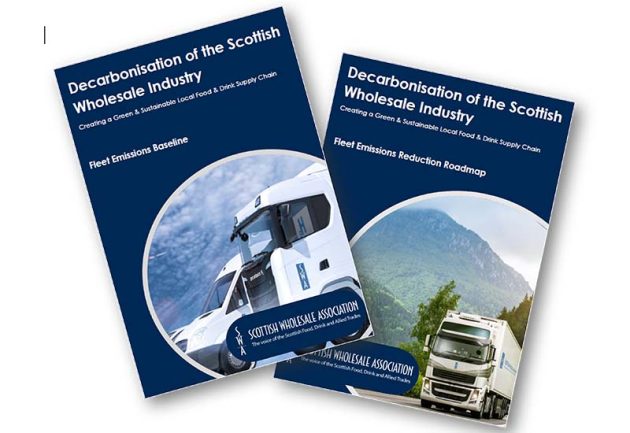
SWA calls for government to support wholesale emissions reduction
Scottish Wholesale Association (SWA) Chief Executive Colin Smith issued a rallying cry to Scottish government to support wholesalers to decarbonise the industry
Smith’s impassioned message comes on the back of SWA publishing the findings from the first phase of its Decarbonisation of the Wholesale Industry project.
The study focused on emissions from vehicles and fleets used with the Scottish food and drink wholesale industry, and highlighted that 75% of the sector’s fleet emissions are from HGVs – versus 17% from vans. This equates to 111,000 tonnes of CO2 per year.
The problem facing the sector to be more sustainable is stark, with SWA discovering no commercially viable zero-emission HGVs available in the UK and while hydrogen-powered vehicles may be viable in the future, adoption is several years away.
With the prohibitive cost of new vehicles and adaptation and lack of fuelling infrastructure to seriously consider a switch to hydrogen, Smith says Scottish government needs to step in.
“These newly-available figures shine a spotlight on the barriers and challenges facing food and drink wholesalers – the ‘wheels to the food and drink industry’ – as they seek ways to reduce their carbon footprint,” said Smith.
“The will is there but our members need more support from the Scottish government to get there.
“We need the Scottish government to provide financial support for wholesalers to implement, a wholesale industry-wide driver efficiency training programme to reduce emissions.
“Some of our members are already using tools to help reduce emissions through driver efficiencies but we need more financial support to enable more wholesalers, particularly smaller ones who have suffered so much over the past 18 months, to join us on this important journey.”
The SWA is also asking for wider financial support from government to set up a wholesale fleet audit service, enable the transition to green fleets, and for research that will help identify further routes to efficiencies with the wholesale sector.
SWA has already shown its desire to work with other industry partners and technology developers to find solutions to the challenges they face.
Earlier this year, SWA joined forces with Arcola Energy to identify the business case for fuel cell technology in the UK’s transition to zero-emission road freight.
The Scottish Hydrogen Fuel Cell Freight Trial (SHyFT), led by London-based Arcola Energy, has secured funding from the Department of Transport’s Zero Emission Road Freight programme for the design of a trial of hydrogen fuel cell trucks, supported by a green hydrogen refuelling infrastructure in Scotland and SWA members are involved in this trial.
“Our work, designed to help SWA members and the wider wholesale sector become greener and more sustainable, will also help other sectors,” Smith added.
“Our plans to decarbonise the wholesale food supply chain and achieve net-zero emissions by 2045, if not before, are ambitious but as we have heard during the COP26 climate change summit in Glasgow – countries, governments and businesses must be bold in their approach.
SWA’s report into fleet emissions is available now, along with its fleet emissions reduction roadmap.
Phase two of SWA’s project will focus on wholesalers’ buildings and cold storage with phase three then concentrating on how people/employees move around to, from and within their jobs.









